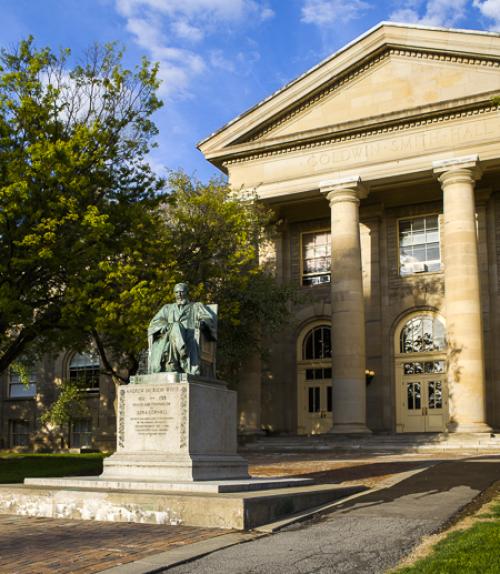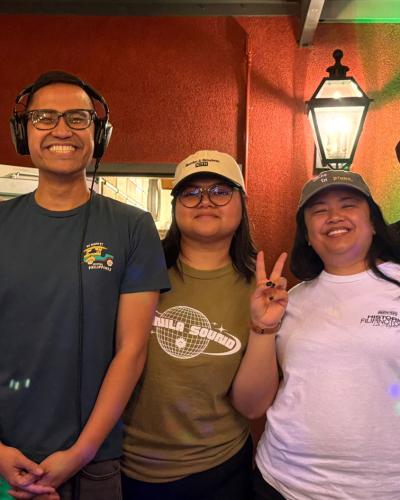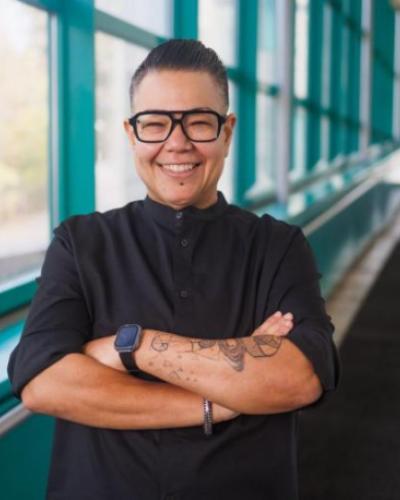CW: This article includes discussions of police violence.
PMA Ph.D. Alum Nick Fesette ’18 has published an essay called “Abolitionist Laughter: The Joint Movement to #StopCopCity” in Theatre Journal’s newest special issue on Abolition and Performance, edited by Ariel Nereson.
In the essay, Nick discusses the construction of a mock city block in Atlanta, GA, “where police will train in urban warfare.” He focuses on the #StopCopCity activist movement opposing it, and the place of laughter in the resistance. “Sometimes when you’re faced with a situation that’s so evil, twisted, and perverse, all you can do is laugh,” says Fesette. “And that laughter has power.”
The essay appears here through Johns Hopkins University Press.
Nick Fesette spoke about the article in a recording of the video series Theatre Journal Shorts from the Association for Theatre in Higher Education (ATHE). He was interviewed by online editor Tarryn Li-Min Chun. We excerpt that interview here:
Tarryn Li-Min Chun: Can you begin by sharing a summary of the article and its main argument?
Nick Fesette: “My article is about the movement to #StopCopCity. [Cop City is a place] where police from around the world come to a mock city block and train in urban warfare. The whole enterprise is costing millions of dollars in private and taxpayer money. Activists have called this Cop City, and there’s been a movement to obstruct it. My article starts on June 5, 2023 when the Atlanta City Council opened the floor for public comment on the facility. Hundreds of community members came out and voiced their opposition to the construction of Cop City. After the public comment section, City Council voted in support of Cop City, which effectively ignores hundreds of their constituents. My article looks at this meeting, at the use of abolitionist humor by the activists in that meeting and in the broader movement. I argue that humor brought people together in acts of abolitionist refusal.”
The article is divided into three parts. In the first part, I provide further context about #StopCopCity and some analysis of the movement. In the second part, I look at the way police use laughter as a way to seductively obscure their violence. In the last part, I memorialize Indigenous queer environmental activist Manuel "Tortuguita" Paez Terán, who was murdered by Georgia police, and I discuss the ecological dimension of the police and prison abolition movement.”
TC: How does this article connect to the broader concerns of your research?
NF: “My work is interdisciplinary. It connects abolition and critical prison studies with theatre and performance studies. This article is revised from a chapter of my book in progress, titled Performance After Policing: Abolition Dramaturgies in Carceral America and my book not only considers how performance contributes to liberatory and abolitionist movements, but also looks at how performance has historically served to support and circulate the logics of imprisonment – my article is about humor being useful for abolitionists but also how humor is useful for the police.”
#StopCopCity is a local movement, but it has global connections. If your municipality hasn’t already built a Cop City, they’re planning to do so. I think that laughter offers one possible avenue for radical action. These cop cities are so evil, that laughter can be a way to connect you with other people and get you moving on the ground.”
TC: What are some of the key takeaways of your article?
NF: “The first is that theater and performance are always political, policing is always political, and that the politics of these things are never innocent.”
The second is that my article is about the overlap between theory and practice. Traditional scholarship is in the theory bucket, and practice is what we do with our bodies. I think scholars are artists and artists are scholars. My article is trying to toggle between theory and practice and show how these ideas are aligned.”
The final thing I’ll offer is that performances like the public comment section of the Atlanta City Council meeting – these are performances that can be important objects of studies and yet they’re often ignored. We should think about the ways in which everyday people move in the world. Public comment can be analyzed using similar analytical frameworks to better understand how it mobilizes radical demands for transformation.”
Read more about Nick Fesette.





